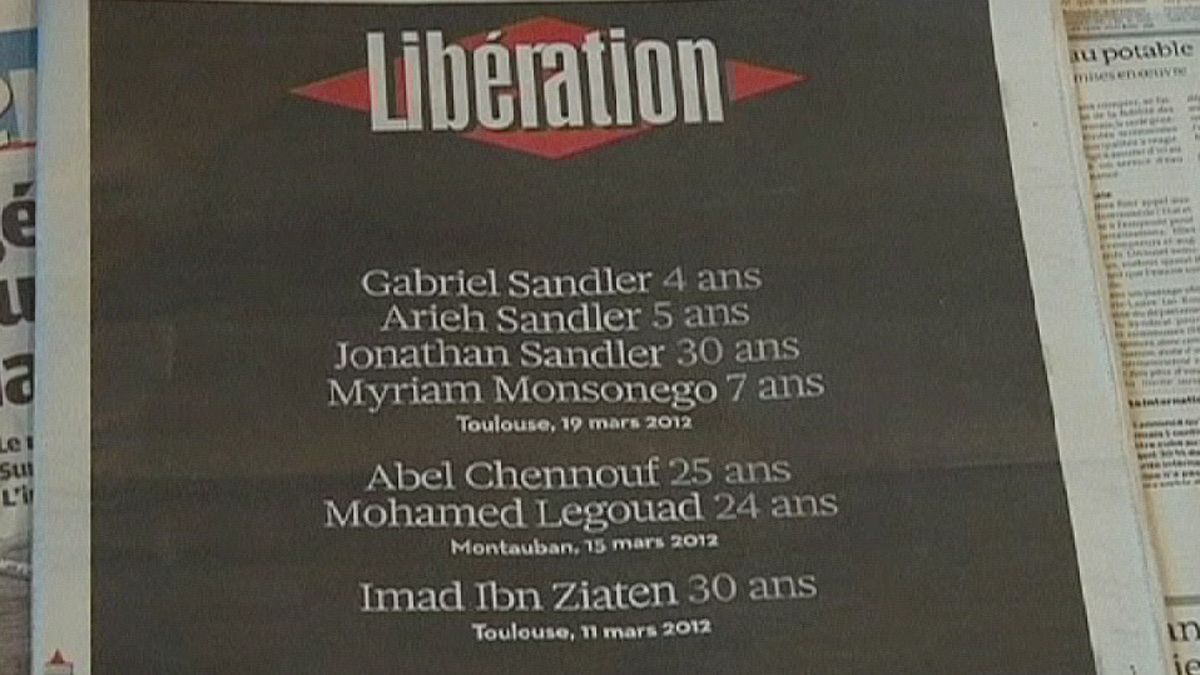Is there a serial killer at work, committing racist crimes? Investigations are still in the early stages, but, with electoral campaigning for France’s presidency under way, murders in the southern cities of Toulouse and Montauban have plunged the country into fear and confusion.
euronews sought an expert’s opinion on the political impact. But first, here is a brief review of what happened, and France’s politicians reacted.
On Monday, three children and a teacher were killed in front of Ozar Hatora, a Jewish school in Toulouse. The bloodiest attack on the Jewish community in France in 30 years happened with presidential elections 34 days away.
The weapon used by the murderer, the scooter he rode and his deliberate method suggested links with the murders last week of three paratroopers in Montauban and Toulouse.
President Nicolas Sarkozy went to the school to offer his condolences.
Sarkozy said: “It seems obvious that the motivation here, attacking Jewish children and a teacher, was anti-semitic. Where our soldiers are concerned, two of them were Muslims and the third was from the Antilles. We don’t know the motive there, but we could think that racism and murderous insanity were linked.”
The candidate for the Socialist party, François Hollande, also went to Ozar Hatora.
Hollande said: “I had to be here to say to these families torn by murder, and to those at this Jewish school which was targeted, the depths to which anti-semitism has sunk. I also have to express my solidarity with the city of Toulouse, to say that it wasn’t a school, Jews, a city that have been affected by this, but all of France.”
The killings that shook the country also made their mark on the electoral campaign.
Third-placed candidate, according to surveys, Marine Le Pen of the Far Right said: “At times like this, politics stops; campaigning stops; there is no longer the right and the left. The people of France feel it in their heart.”
Campaigning is expected to resume sooner rather than later, against the shocking backdrop of the bloodshed.
Euronews spoke to Dominique Wolton, director of the French Institute of Communication Sciences, the CNRS, a noted specialist in the media and political communication, to ask for his opinion on the political effects of the murders.
Sophie Desjardin, euronews: Is what happened in Toulouse going to affect the presidential election campaign in France?
Dominique Wolton: We really don’t know. What’s certain is that there’s already been something positive: the unanimous reaction of all the candidates. That was essential, in the name of the Republic or democracy, firmly condemning the murders.
euronews: Will the subjects of recent discussion, apart from the economic crisis, be toned down?
Wolton: It’s not that things will be muted. It’s rather that verbal confrontation will become less violent, because we’re already in a country in crisis, in which a large part of the electorate does not feel involved, and so there is a threat of high abstention.
It’s not that clashes will be avoided but that people talk in terms that are too soft. There can be a very violent clash about theory, policy, ideology, on condition that we respect one another. In this campaign, that started out violently, with a risk of high abstention, I believe we’ll need to backtrack. So much the better if that brings mutual tolerance.
I think it’s all the more shocking for France that three big institutions are affected. First the army, since it began there – a centre of integration – then schools. They are the second factor of integration in our society. And also secularism, respect for all religions.
I think the strength of caring and the political and cultural reaction of the candidates goes much further than public opinion, because these three pillars of society are affected. In a way, that might make some people think about the importance of integration in our society, the weaknesses of our institutions. I think that’s an important lesson.
euronews: Do you think that politicians bear some responsibility, with the speeches they’ve made recently, sometimes quite forcefully, notably about immigration?
Wolton: No, we can’t talk about cause and effect. However, the problem for France, and also for Europe as a whole, is that we’re the most democratic part of the world, and when it comes to talking about immigration we see vocabulary being squeezed, and posturing, racism and populism, which do not go along with the great democratic mission that Europe wants to assign itself.
Immigrants become scapegoats, and that’s a tragic logic to follow. It’s not unusual that it brings a kind of verbal violence that we find in 18 of the 27 European Union countries.We are really at risk of Europe’s own values self-destructing.
euronews: We’ve seen a surge of intercommunal solidarity, a need to feel united. That will have to be sustained, which is difficult, is it not, in an election campaign where people are looking to create divisions?
Wolton: No, I think that the tragic event can serve to lay that question to rest. If the main religions show solidarity I think it will have to be heard for four or five days. That way, when the political mania starts up again, the tragic events will stay in people’s heads. Everyone today sees and knows everything, thanks to the media, and that forces politicians, religious forces and Europeans to be much more faithful to their values.

